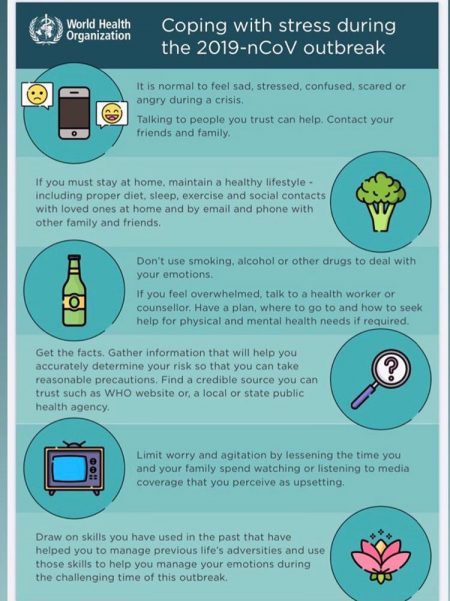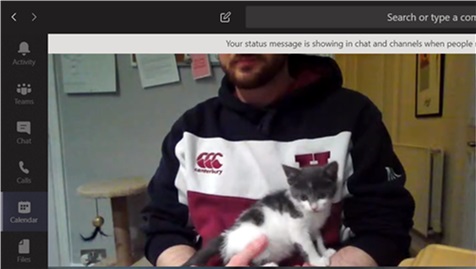
A poll of HR professionals has shown that general anxiety, caused by the coronavirus outbreak, is the main challenge faced by employees right now. Fears of economic upheaval, job uncertainty, childcare and worries of relatives becoming sick, or becoming sick themselves, all whilst adjusting to home working and the broader effects of lockdown – every member of the workforce has a lot to deal with. Our friends at Manchester Digital have produced some excellent advice on looking after your employees’ mental health and wellbeing during the coronavirus outbreak, which we’re happy to share below. We’ve also included examples of how our members are supporting their teams.
Communication is key
There is enough ambiguity in people’s lives right now; information vacuums from employers will only further fuel employees’ anxieties. Therefore, it’s vital that you decide company policy on matters such as sick pay, furloughing employees and annual leave, and that you are communicating your plans accordingly.
Then, it’s important to keep open regular lines of communication with employees so that they can understand what’s happening as the situation changes. Clear and frequent communication, irrespective of whether the news is good or bad, is extremely helpful for your employees’ state of mind.

Set an example; encourage employees to have a positive work-life balance
For some reason we can often work longer hours when working from home. Many feel a pressure to be ‘always on’, scared of looking like they’re not working and instead working too much. If your employees fall into the trap of working long days it won’t be long before they burn out.
That’s why it makes sense to encourage employees to avoid working longer hours than they normally would, and to stress the importance of taking designated breaks. One way of doing this is by setting a good example and making sure you’re taking your breaks, exercising within the guidelines and working reasonable hours.
It might be worth asking your leadership teams to create short diaries of their working days to show the rest of the company that senior leaders are taking breaks and that they should too.
Set realistic and reasonable expectations, followed by support
As well as encouraging staff to not overwork, now is the time to appreciate that not everyone is going to be able to deliver work as they normally would. Working from home, especially for those with children or family to care for, will be challenging for some. Therefore, it’s recommended to measure outputs instead of desk-time to provide flexibility to the staff that need it.
It’s also important that you let staff know you understand their capacity issues. Telling staff you are ready to support them as best you can you will go a long way to alleviating any unwarranted anxiety they may have around underperforming in these challenging times.
Have staff responsible for the mental health of others
If your team has trained Mental Health First Aiders, make sure your staff know who they are and how to contact them with any concerns they may have. You can also ask your Mental Health First Aiders to create wellbeing plans for your team. If you don’t have anyone trained in your organisation, maybe now is a good time to invest.

Signpost effectively
There’s plenty of great advice and support available. Take advantage of content that’s been put together, such as this fantastic NHS guide on maintaining mental health whilst working from home during the current restrictions.
You can also point your staff in the direction of wellbeing resources such as Headspace or the great articles below…
- MIND Coronavirus Toolkit
- BBC: How to protect your mental health
- Public Health England COVID-19: guidance for the public on mental health and wellbeing
- Mental Health Foundation: Looking after your mental health during the Coronavirus outbreak
- Combat Stress: Self-care during COVID-19
- Mental Health at Work Coronavirus and isolation: supporting yourself and your colleagues
Whilst not specific to the coronavirus outbreak, Mental Health at Work has a toolkit for small workplaces. This offers a free, quick e-learning programme for employees, from Mind.
Ensure you’re offering regular check-ins
By utilising technology you can run daily check-ins with your team via Skype, Teams or Zoom. These check-ins provide an opportunity for you to inform staff of any updates whilst helping them to overcome the effects of isolation. Some companies are adopting a ‘camera-on’ policy during web meetings to allow people as much face-to-face contact with their teammates as possible.
Daily check-ins also provide a platform for you to signpost articles, wellbeing resources and the support of your mental health first aid trainers.
It’s also worth considering setting up non-work check-ins. Virtual coffee mornings or lunch breaks that let your employees catch up and discuss anything from how they’re coping, indoor exercising tips, or even the weather will add a healthy dose of normality to people’s working lives and will be greatly appreciated by your team.
What are Sheffield companies doing?
Joi Polloi
“We are a really sociable team so it’s been quite hard to adapt to, but we’ve made sure that we keep in constant contact by having entire team stand-ups each morning at 9.15 and we’ve tried to make these as fun as possible, doing everything from game-show style activities to fancy dress. This has been great to ensure everyone has direction with their work but also to make sure that everyone is getting the chance to have a face-to-face chat with someone each day.
“We also had a virtual leaving party for one of our colleagues a couple of weeks ago where the company provided everyone with a food/drink voucher for us to get some supplies for the night and we did a quiz and games via Zoom.” – Kim Davies, Operations Manager
Bossa Nova
“The biggest priority for us is and has always been the physical and mental wellbeing of our teams. That is our first and foremost concern.
“We are determined to maintain a really positive spirit among the team, with clear succinct, regular and factual communications from leadership. It’s also about acknowledging life is different at the moment, and employees often have their families or little ones to look after. We’ve got to recognise individuals’ differing needs and be flexible to that – whether it’s childcare, food shopping or caring for elderly relatives.” – Red McKay, Managing Director of Bossa Nova Robotics Europe Ltd.
Moore Insight
“We have daily 30 minute online meetings with the entire team where we check in on each other, provide any important updates regarding COVID-19, and generally have some fun, so as not to lose the connection and rapport we would normally have in the office. In one we wore silly hats, and we encouraged one of our employees to include his new kitten on the call!

“Recently, we have been doing quizzes during the call, produced and shared by a different member of staff each day, via Microsoft Forms. The quizzes have been such a hit, in fact, that we have also hosted an evening ‘Pub Quiz’ for the team, as a means of connection and entertainment ‘outside of work’, where family and friends were also welcome to join in the fun.
“Two of our team members also created a ‘Lockdown Fitness Challenge’; this was presented to us as a Powerpoint Presentation which included information on the benefits of exercise to your mental health (the key to a good night’s sleep etc.), and guidance on how to take part if you are still a beginner. We also have a dedicated Teams channel committed to Health and Wellbeing, where employees can post tips and update on how they are managing with their wellbeing during isolation.” – Isobel Cox, Business and Project Support Officer.
Thank you
We are really grateful to our friends across the Pennines, Manchester Digital, who put this content together and kindly let us share it. Thanks!
If you have any tips we can add to this, please post a comment below.